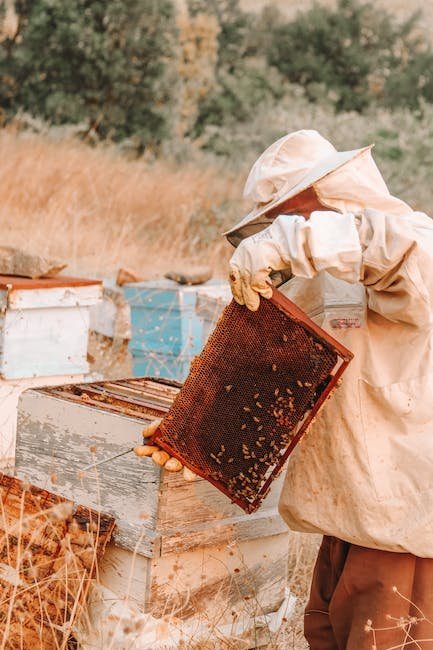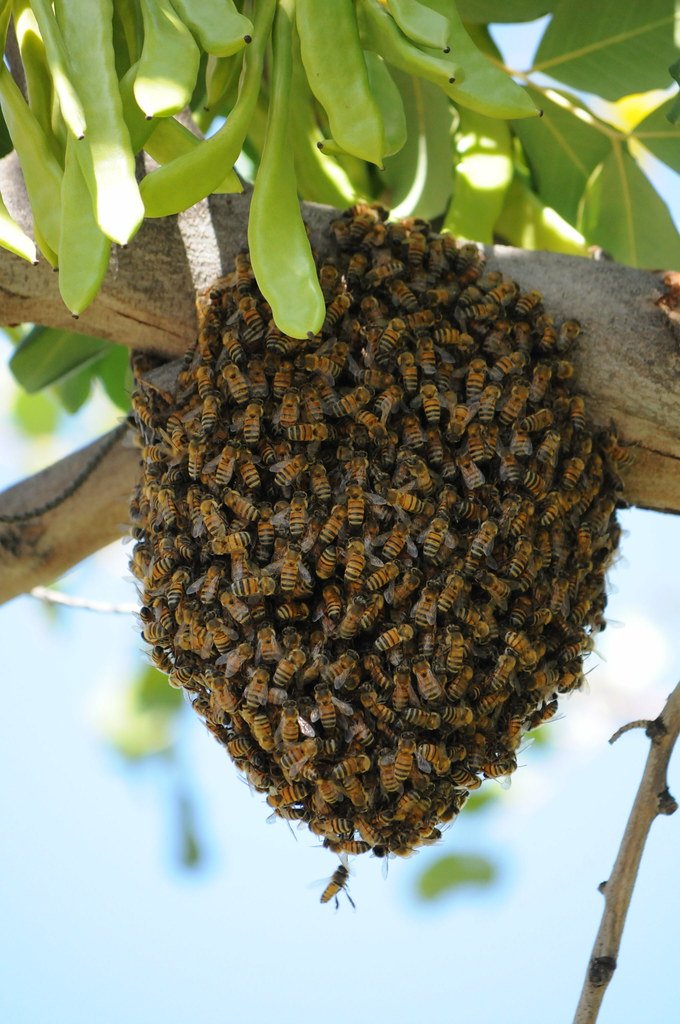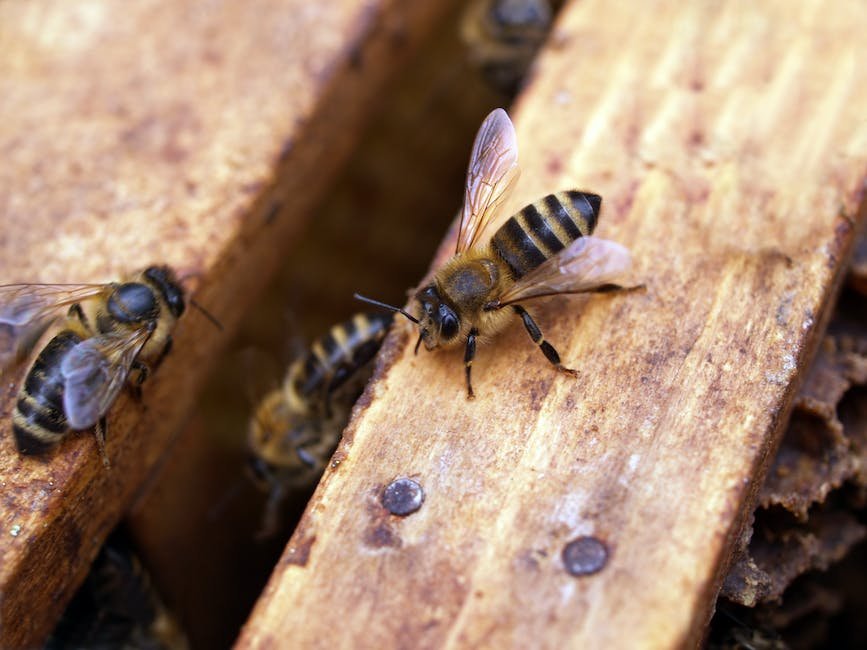To the hardworking beekeeper, few things are more disheartening than discovering that their beloved hive has fallen prey to robbers. This clandestine invasion, known as hive robbing, not only threatens the livelihood of the bees but also puts the carefully cultivated honey at risk. Fortunately, there are ways to tackle this perplexing issue head-on. From preventative measures that fortify the hive’s defenses to ingenious solutions that deter potential marauders, beekeepers can arm themselves with the knowledge and tools necessary to safeguard their buzzing colonies. In this article, we will delve into the depths of hive robbing and explore effective techniques for managing it. So, don your beekeeper’s suit and prepare to learn how to outsmart those rascally robbers!
Table of Contents
- Recognizing the Signs of Hive Robbing
- Minimizing the Risk Factors: Essential Preventative Measures
- Effective Strategies to Protect Your Hive from Robbers
- Quick and Strategic Responses to Combat Hive Robbing
- Creating a Sustainable Environment for Beekeeping Success
- Q&A
- In Conclusion

Recognizing the Signs of Hive Robbing
Hive robbing is a common problem that beekeepers face, where other bees from different colonies invade and steal resources from a weaker hive. It can be detrimental to the health and productivity of the targeted hive if not detected and addressed promptly. Here are some signs to look out for:
- Increased Aggression: When hive robbing occurs, the defending bees will become more aggressive towards any intruders. They may sting repeatedly and show defensive behavior such as head-butting and chasing.
- Unusual Bee Activity: An alarming increase in bee activity around a hive could be a clear sign of hive robbing. Bees from the targeted hive may appear confused or disoriented as they try to defend their resources.
- Decreased Hive Population: Hive robbing can lead to a significant reduction in the population of the targeted colony. If you notice a sudden drop in the number of bees in a hive, it’s essential to investigate further.
- Pilfering Behavior: Keep an eye out for bees carrying away large amounts of pollen, honey, or even brood from another hive. These robber bees will often move swiftly and with purpose.
is crucial in order to take immediate action to protect your hive. If you suspect hive robbing, consider implementing deterrents such as reducing hive entrances, adding screen doors, or temporarily relocating weaker hives to minimize the risk of attack.

Minimizing the Risk Factors: Essential Preventative Measures
In order to protect ourselves and those around us, it is crucial to take essential preventative measures to minimize the risk factors. By following these simple yet effective steps, we can create a safer and healthier environment for everyone.
1. Practice Good Hygiene:
- Regularly wash your hands with soap and water for at least 20 seconds.
- Use hand sanitizers, containing at least 60% alcohol, when soap and water are not available.
- Avoid touching your face, especially your eyes, nose, and mouth.
- Cover your mouth and nose with a tissue or your elbow when coughing or sneezing, and dispose of the tissue immediately.
- Regularly clean and disinfect frequently-touched objects and surfaces, such as doorknobs, cell phones, and keyboards.
2. Maintain Social Distancing:
- Keep a safe distance of at least 6 feet from others, especially if they are coughing, sneezing, or not wearing a mask.
- Avoid crowded places, large gatherings, and close contact with anyone showing flu-like symptoms.
- Opt for virtual meetings and online communication whenever possible for work or social gatherings.
- When interacting with others, wear a mask that covers your nose and mouth, to prevent the spread of droplets.
3. Adopt a Healthy Lifestyle:
- Boost your immune system by eating a balanced diet, rich in fruits, vegetables, and whole grains.
- Engage in regular physical activity, such as walking, jogging, or practicing yoga, to enhance your overall well-being.
- Get sufficient sleep each night, as it plays a crucial role in maintaining a strong immune system.
- Manage your stress levels through techniques like deep breathing exercises, meditation, or engaging in hobbies you enjoy.
By diligently incorporating these essential preventative measures into our daily routines, we can take significant steps towards minimizing the risk factors and safeguarding ourselves and our communities.

Effective Strategies to Protect Your Hive from Robbers
Beekeepers often face the challenge of protecting their hives from robbers, which are other bees or insects looking to steal honey. It’s crucial to implement effective strategies to ensure the safety and productivity of your hive. Here are some creative and unique strategies to safeguard your precious hive:
- Establish entrance guards: Assign vigilant worker bees to guard the hive entrance. These guards will challenge any unfamiliar bee attempting to enter, protecting the hive from potential robbers. By training select bees for this task, you can create an additional layer of security.
- Use scent-based deterrents: Robbing bees often rely on scent trails left by their accomplices to locate hives. Disrupt these trails by placing scented distractions, such as peppermint or lemongrass essential oil, near the entrances of your hive. This diversion can confuse robbers and prevent them from identifying your hive as a target.
- Install robbers screens: These special screens are placed over hive entrances, creating a small maze that robbers struggle to navigate. The design allows your bees to easily pass through while making it difficult for unfamiliar bees to enter. Robbers screens safeguard your hive without hindering the natural movement of your bees.
- Create decoy hives: Provide decoy hives a short distance from your main hive. These decoys can attract robbers, diverting their attention away from your valuable honey producers. Ensure the decoy hives are stocked with minimal or no honey, so robbers concentrate their efforts there instead of your main hive.
- Regular inspections: Stay vigilant by conducting frequent inspections on your hives. Look for signs of robbing activity, such as sudden decreases in honey stores, increased aggression between bees, or excessive fighting at the entrances. Timely identification of robbers allows you to implement necessary protective measures immediately.
By implementing these efficient strategies, you can safeguard your hive from potential robbers and preserve the harmony within your honey-producing community. Stay proactive and creative in defending your hive to ensure its thriving productivity.

Quick and Strategic Responses to Combat Hive Robbing
Protecting your beehives from hive robbing is crucial to maintain the health and productivity of your colonies. To effectively combat this issue, it is important to employ quick and strategic responses. Here are some tips and tricks to help you safeguard your hives:
- Identify the signs: Regular inspections are key to detecting hive robbing early on. Look for aggressive behavior from bees, increased activity near the entrance of the hive, and a sudden decline in population.
- Strengthen hive defenses: Enhance the security of your hives with physical barriers such as entrance reducers or screens. This helps to limit access and redirect the robber bees away from your colonies.
- Fortify with distractions: Provide alternative food sources for potential robbing bees. Placing a feeder away from your hives with a different scent or flavor will divert their attention and deter them from targeting your colonies.
- Consider relocation: If hive robbing becomes persistent and problematic, relocating your vulnerable hives to a more secluded area might be necessary. This can disrupt the robbers’ familiarity with your apiary and reduce future robbing incidents.
- Monitor and intervene: Regularly monitoring hive activity and inspecting hive frames can help you identify weak or vulnerable colonies. Promptly addressing any issues, such as a failing queen or low food stores, can prevent your hives from becoming easy targets for robbers.
By implementing quick and strategic responses, you can effectively combat hive robbing and ensure the well-being of your cherished honeybee colonies. Remember, prevention is key, so stay vigilant and take proactive measures to protect your hives from this disruptive behavior.
Creating a Sustainable Environment for Beekeeping Success
Beekeeping is not just a hobby; it’s a way of creating a sustainable environment that helps both bees and the planet thrive. By implementing a few key practices, you can ensure the success of your beekeeping venture, while also playing a vital role in preserving these essential pollinators.
To begin, it’s important to provide a diverse range of plants and flowers in your beekeeping area. Bees rely on a variety of nectar sources for their survival, so creating a bee-friendly garden filled with native plants can greatly enhance their well-being. Consider planting bee-friendly favorites like lavender, sunflowers, and borage, which provide bees with a rich and nutritious food source.
In addition to a diverse landscape, maintaining a pesticide-free environment is crucial for beekeeping success. Pesticides can be harmful to bees, disrupting their natural behavior and even causing colony collapse disorder. Instead, opt for organic practices that minimize the use of chemicals, ensuring the health and vitality of your bee colonies.
- Provide a diverse range of plants and flowers in your beekeeping area.
- Plant bee-friendly favorites like lavender, sunflowers, and borage.
- Create a pesticide-free environment to protect bees from harm.
Remember, beekeeping is about more than just harvesting honey. It’s about creating a sustainable environment that fosters the well-being of these incredible creatures. By prioritizing their needs and taking steps to maintain a thriving ecosystem, you can ensure the success of your beekeeping venture while contributing to the conservation of bees and the planet.
Q&A
How does hive robbing occur?
Hive robbing occurs when bees from one colony attempt to steal honey, pollen, or resources from another colony. This often happens during times of scarcity or when a weaker colony is unable to defend itself.
What are the signs of hive robbing?
Signs of hive robbing include increased aggression outside the hive, a large number of bees fighting near the entrance, bees trying to enter other colonies, and a sudden decrease in honey stores.
How can I prevent hive robbing?
To prevent hive robbing, ensure your colonies have enough food and resources, maintain strong hive defenses, and reduce robbing triggers such as leaving excess honey or hive debris exposed.
What should I do if I suspect hive robbing?
If you suspect hive robbing, reduce the hive entrance size, provide additional ventilation, and close the hive temporarily until the robbing behavior stops. It’s also important to identify and address the root cause of the robbing to prevent future incidents.
Are there any natural deterrents for hive robbing?
Yes, there are natural deterrents for hive robbing. One effective strategy is to place branches or screens in front of the hive entrance, creating an obstacle course for robbers. Additionally, planting strong-smelling herbs like mint or lavender around the hive can help deter would-be robbers.
How can I strengthen weak colonies to prevent robbing?
To strengthen weak colonies, provide them with enough food, ensure they have a laying queen, and consider combining them with a stronger colony if necessary. Regular hive inspections and management practices can help prevent weakness and make colonies less attractive targets.
Should I intervene when witnessing hive robbing in the wild?
Intervening in hive robbing in the wild is generally not recommended unless there is evidence of extreme aggression or a risk to human safety. Bees have evolved to handle such situations, and interference could disrupt natural processes.
What are the long-term effects of hive robbing on colonies?
Hive robbing can have serious long-term effects on colonies, including weakened and stressed bees, reduced honey production, and increased susceptibility to disease and pests. It is crucial to address hive robbing promptly to safeguard the health and productivity of the affected colonies.
Are there any legal implications of hive robbing?
The legal implications of hive robbing may vary depending on local regulations. In some regions, hive robbing can be considered a form of theft, and legal consequences may apply. It is advisable to consult the appropriate authorities or beekeeping associations to understand the legal framework in your area.
In Conclusion
As the bees return to their hives, laden with the fruits of their labor, there is no denying the harmonious buzz that fills the air. A well-managed hive is a sight to behold, a bustling bee metropolis where order and productivity reign supreme. However, lurking in the shadows, a diabolical threat awaits – hive robbing.
In the quest to protect our precious hives, we have embarked on a journey through the art of prevention and the ultimate search for solutions. With each piece of knowledge gained, we have armed ourselves with the tools needed to ward off this insidious act of thievery.
But let us not forget the delicate balance of nature. Hive robbing, while a nefarious deed, is but a reflection of the survival instinct of bees. Their relentless pursuit of sustenance leaves them no choice but to resort to desperate measures. And so, as diligent beekeepers, we must find ways to coexist harmoniously with these buzzing bandits.
Through the pages of this article, we have explored a myriad of preventive measures. From common-sense practices like regular hive inspections, to the strategic placement of entrance reducers, we have sought to fortify our hives against the onslaught of robbers. We have delved into the power of scent, employing the alluring fragrances of essential oils to confuse and ward off potential intruders. Let us not forget the virtue of vigilance, for it is in our attentive gaze that we can spot the early signs of an impending robbery.
Yet, when the inevitable occurs, and robbers descend upon our hives like shadows in the night, we must rise to the occasion with the strength of resolve. We have explored battle-tested solutions to combat this menace. Creating a diversion with feeding station decoys, installing robbing screens that only allow our genuine hive dwellers access, and even resorting to the almighty power of traps – these are the weapons we wield in the never-ending fight against hive robbing.
And so, as we come to the end of this odyssey, let us remember that prevention is our most valuable asset. A combination of vigilance, knowledge, and understanding will enable us to protect our hives and sustain the delicate dance between bees and their environment. May this knowledge be a beacon of hope for all who face these challenges, so that the buzz of our hives remains a symphony of harmony, undisturbed by the dark forces of hive robbing.
As an affiliate, my content may feature links to products I personally use and recommend. By taking action, like subscribing or making a purchase, you’ll be supporting my work and fueling my taco cravings at the same time. Win-win, right?
Want to read more? Check out our Affiliate Disclosure page.